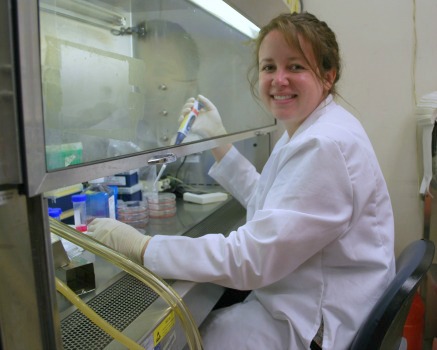
The author working at the cell culture hood.
As I approach graduation, I find myself reflecting on my past.
I remember when I first applied to Einstein, and stepping through the sliding doors in the front of Forchheimer trying to prepare myself mentally for interviews. Weathered white coats, the smell of freshly brewed coffee and conversations regarding realms of science I had never set foot in. “You’ve got this,” I would tell myself; I had to convince myself not to sit this one out.
I was terrified during my interviews, but I had to find the courage in me somewhere, and without it, I wouldn’t be able to reflect today on all the milestones that I have reached over the past 6 years. I was ecstatic when I received my acceptance letter.
The First Milestone: Overcoming Fear
Most of my undergraduate work was in the field of organic synthesis, and I had spent very little time developing proficiencies in molecular biology techniques. Pipettes and I were only acquaintances back then.
As I began my thesis work, I bid farewell to the chemical hood, and my first task was to learn how to split cell lines, something I had never done before. Though this hurdle seems incredibly small now, it was the beginning of me getting rid of my fear to fail at something or make mistakes.
The Second Milestone: Coffee and a Love for the Field of Oncology
Completing the first year and a half of graduate school was exciting, eye-opening, and sometimes sobering. I would soon embark on another hurdle, the qualifying exam, which indicates whether a student has sufficient knowledge to continue with their thesis work and proceed toward the doctoral degree. It had been quite a long time since I was a regular at Starbucks. While studying for the qualifying exam, they knew exactly what I wanted – venti coffee, black, no sugar. That, coupled with the Electronic for Studying channel on Pandora, was my go-to for several months. Preparing for this exam was the first time I realized how much science I was actually capable of cramming into my sleep-deprived brain. However, in the process, I started to develop this complete fascination with cancer cells, specifically the many bizarre traits they acquire, and how these features contribute to their ability to wreak havoc on the human body. It was exhausting and captivating at the same time. This experience cemented my love for the field of translational oncology – I knew it was where I wanted to make a contribution, whether big or small.
The Third Milestone: Gaining Scientific Independence
There were many more obstacles to overcome through the four years following my qualifying exam – failed experiments, laborious protocol optimizations, analyzing huge volumes of data, and a sense of impending doom every time I had to listen to an ultracentrifuge accelerate. However, I learned things about myself that had I not endured these challenges, I am sure I would have never uncovered. I discovered that I love microscopy, and that I could sit and analyze patient biopsies for hours, developing a sincere appreciation for the blood, sweat and tears that go into a compelling, well-written publication. Most importantly, when something did not go as planned, I learned to not be discouraged, and the long, tough grad school marathon is what makes a scientist. I finally felt that I had the skills it takes to drive a project forward and be a productive member of the scientific community.
The Final Milestone: A Doctor Reflecting on the Past
I was a musician in high school. I lived and breathed Mozart, Vivaldi, Chaminade, Taffanel, Faure, Bach, Gaubert, Debussy….the list goes on….Though I was a decent student, I was more focused on perfecting and performing a challenging piece; although, if there was one subject that I was devoted to, it was science. When the time came to think about going to college, I was told by an education professional that I likely didn’t have what it takes, making me feel as though I would amount to nothing.
These words were anything but encouraging, but they taught me a valuable lesson: only we know what we are truly capable of, and that we should never be influenced by someone who feels we are incapable of achieving our dreams.
When I defended my thesis, just a little over a month ago, I was still on somewhat of a roller coaster between nervous and excited… but I had accomplished more than what I had originally come here to do, a lot more than what that professional in high school thought I was capable of.
It is imperative to note that there is no way that I would have acquired the skill set, confidence and love for science that I have for today without the unwavering encouragement and support from my advisors, Drs. Hayley McDaid and Susan Horwitz. Then there were my coworkers, my teachers….Graciela Larocca, Dr. Chia-Ping Huang, and Dr. Leleesha Samaraweera… my classmate Deepti, and Edward Nieves, who was like a third mentor. The endless patience and kindness from all of these individuals helped me learn to push myself to my true potential.

